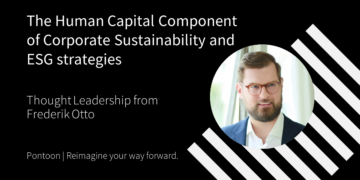Experiential learning — a strategy to attract and retain future ESG talent?
Research
.
As organisations promise to create sustainable environmental policies like carbon neutrality and renewable energy, the question remains: Are business leaders effectively acting on these promises? Publicly expressing the desire to impact the environment is one thing, but implementing a strategic plan is another, and many companies struggle to act. What is the price of that inertia for the company’s talent attraction and retention efforts?
Work culture suffers as leaders fail to understand and impact company ESG goals, with little or no buy-in from internal stakeholders. Research suggests that 56% of workers cannot explain their own companies’ climate commitments — despite an overwhelming 77% who want to act on the issue. Furthermore, PWC reports that 76% of consumers said they would discontinue relationships with organisations that treated employees, communities, or the environment poorly.
How to repair the disconnect?
Cancel the virtual webinars, onsite meetings and virtue signalling and let nature provide the solution. Sending your leadership team on an outdoor retreat to the middle of nowhere will not solve your ESG challenges, but an immersive outdoor experience could prove invaluable. “Experiential learning” is a practise where organisations connect their workforce with the natural world, helping leaders identify and realise company sustainability and ESG goals. These excursions do more than speak to environmental challenges; they show managers the value of protecting the planet.
Leaders partake in outdoor activities during an experiential event, including private nature walks, hiking, and journaling. Organisations such as HSBC and Patagonia are already investing in experiential learning and seeing a positive shift in employee engagement with environmental initiatives. The experience challenges mindsets to spark action in future-proofing ecological sustainability programmes. A positive byproduct is a network of internal champions passionate about the organisation’s ESG efforts.
What can employers do?
Investing in human capital is an essential element in any successful environmental strategy. Business leaders can include experiential learning opportunities in annual budgets, providing executive sponsorship and a path for managers to participate in these activities. To boost worker skillsets and knowledge, organisations should consider hiring talent with sustainability-focused degrees like sustainable design to enhance organisational efficiency and innovation. Employers can also implement experiential learning into their annual learning and development curriculum.
Frederik Otto, Global Head of Client ESG & Impact for Pontoon, advises HR leaders to tie ESG to talent attraction and retention:
“Organisations need to reskill and upskill employees for future ESG endeavours. Implementing and measuring the success of programmes focused on shaping sustainability strategy, such as experiential learning, will help people operations identify, deliver and govern the human capital implications of ESG and sustainability goals and commitments.”
Dr. Jessica Conser, SVP of Global Leadership Development at LHH, adds:
“Companies that focus on sustainable leadership practises have been shown to outperform their competitors through increased engagement, productivity, and retention. More and more clients are asking for experiential learning opportunities because they see the tangible value it provides. As companies prepare their workforce for the future, it’s time to reimagine leadership development naturally, exploring the sustainable intersection between people, profit and the planet.”
Through experiential learning, educated business leaders act as environmental ambassadors for the organisation, organically inspiring colleagues to create a more sustainable future.
Related Post
In 2022 most businesses have understood that they must produce a purpose beyond simply being a vehicle for financial returns. Most Fortune 500 companies have now issued a mission or a ...




